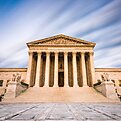Although much of the rhetoric surrounding the new federal vaccine mandates focuses on individual rights—“how dare they force me to inject something into my body?”—the government can generally regulate its own employees, or those it funds with Medicaid/Medicare dollars, so the strongest legally cognizable claims there are for people with valid religious or medical objections. And the latter has to include natural immunity, which provides more robust and durable protection against COVID-19 than any vaccine.
But the more systemic problem comes with the mandate imposed on businesses, requiring all those that employ more than 99 people to have their employees vaccinated. That private-sector mandate, which potentially affects more than 100 million people, presents a constitutional triple threat.
First, there’s a separation-of-powers issue in that this sweeping new regulation is being imposed by presidential diktat, with related claims about the proper scope of OSHA’s statutory authority and whether Congress can even delegate such broad power to the executive branch. There’s also a further related administrative-law claim regarding President Biden or OSHA acting in an “arbitrary and capricious” manner given the serious questions about whether the mandate is drawn with enough care given the science regarding viral spread and harm, the threat to the vaccinated population from the unvaccinated, whether the testing-regime alternative does anything other than create burdens in an attempt to coerce vaccination, the failure to consider natural immunity (again), and other policy details.
Second, even if the executive branch is permissibly interpreting the relevant federal laws, these kinds of impositions are hardly a regulation of interstate commerce (or the use of any other constitutionally enumerated power): states have general police powers to regulate for public health and safety, but the feds don’t. A vaccine mandate as a condition of running a business is even further removed from commerce than a mandate to buy health insurance, which the Supreme Court held wasn’t justified by the Commerce Clause. And remember that the mandate is being forced even on businesses that operate wholly in-state, and on employees as employees, not as travelers or users of the channels of interstate commerce.
Third, forcing private businesses to do the government’s dirty work isn’t a “proper” means of effectuating the goal of limiting the pandemic. Again as in the Court’s ruling in the first Obamacare lawsuit, which found no independent power to compel noncommercial intrastate activity as part of a larger regulatory scheme — what Randy Barnett eloquently called “commandeering the people” — the federal government can’t now commandeer businesses to impose mandates on individuals that it can’t impose directly.
To be clear, the above constitutional-structure issues with the new federal mandates are generally different than the issues that we’ve already seen litigated (and will see even more) with state, municipal, and private vaccine mandates. As a matter of law even more than as a matter of philosophy or policy, it matters what level of government, or more broadly what kind of actor, infringes on individual liberty, in what way, and for what reason. Accordingly, the Biden administration is about to face a tsunami of legal filings.
To be further clear, like my colleague Jeff Singer, I’m pro-vaccine but anti-mandate, which may make me unpopular coming and going, but so be it.

